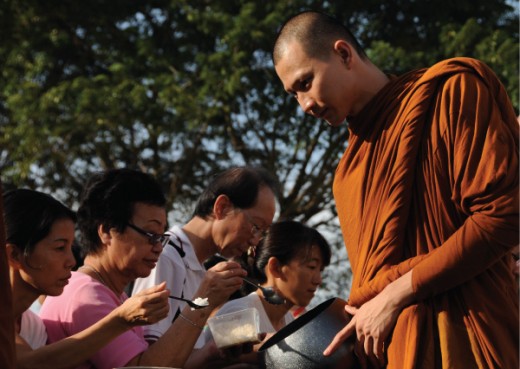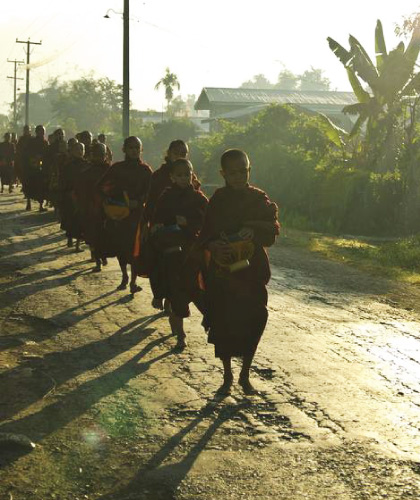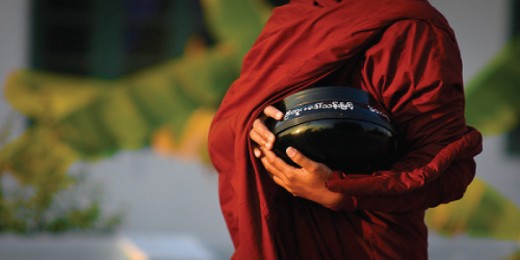Pindacāra – Going on Alms-round
Pindacāra – Going on Alms-round
What is Pindacāra?
Pindacāra, the practice of collecting alms-food, is observed by Theravada Buddhist monks who have gone forth from ‘home-life’ to ‘homelessness’. A Buddhist monk is known in Pāli Language as a ‘bhikkhu’ – meaning ‘one who lives on alms’.
In Buddhist countries such as Thailand and Myanmar, it is a daily ritual for monks to go on Pindacāra, where they walk through a village from one household to another, allowing devotees to make food offerings.
With Pindacāra, Buddhist monks need not worry about food and this afford them time to ponder and practise the Dhamma. Since the time of the Buddha, lay people have been supporting monks this way with food, robes, shelter and medicine. In return, monks provide guidance to the laity on Buddhist teachings, thus forging a close, respectful, and symbiotic relationship between the two communities.
The Theravada monk
A Theravada Buddhist monk only consumes food between the break of dawn (around 7am in Kuala Lumpur) and noon (12pm). Thus, he does not go about collecting alms-food after mid-day. The monk goes on Pindacāra mindfully observing ‘noble silence’. He does not engage in talking or chatting with others.
The Alms-bowl
The monk’s alms-bowl is only used to receive cooked food offered by willing donors. The monk strictly does not accept money with his bowl or on his alms-round.
Benefit to lay devotees
Offering alms-food to monks allow lay people to acquire merits as a result of their kind intentions and actions. Doing good deeds daily is a way of self-cultivation and to live a noble way of life. The proper way for the laity to offer alms is to perform it joyfully, mindfully, and respectfully towards the monk(s).
A Buddhist Heritage
Amidst the hustle and bustle of modern living, it is most joyful and inspiring to still be able to witness this ancient tradition of Pindacāra being practised, what more to participate in it!
Pindacāra Practicalities
Nalanda Buddhist Society organises monthly Pindacāra at the morning markets in Taman Overseas Union Garden (O.U.G.) and in Seri Kembangan. Members of the public are welcome and encouraged to participate in this meritorious and joyful activity.
Below are some helpful information for donors and participants :
Types of Offering
- You may offer any type of cooked food such as plain rice, vegetable dishes, cakes, or ripened fruits. Kindly wrap the food with suitable or reusable wrapping material, or place it in a clean container.
- Uncooked food such as packets of rice or dry noodles can be offered to the monastery but should not be placed into the monk’s bowl; it should be handed over to our volunteers instead. Our volunteers will arrange for your offerings to be sent to monasteries nearby.
- Uncut fruits can be offered as well. Our volunteers will cut them and offer them to the bhikkhus at their meal time.
- Bhikkhus do not accept uncooked meat, raw eggs or fish.
- Requisites such as robes and medicine can be offered when the bhikkhus are at their monasteries or at Nalanda centres.
- Give only what is appropriate, and do so voluntarily.
Important to know
- Theravada monks only consume food between the break of dawn (around 7am) and noon. Therefore, they do not go about collecting alms after 12pm.
- Bhikkhus do not accept money. You may make a donation to Buddhist centres instead. Beware of ‘bogus monks’ going around offering amulets and trinkets for sale. Do not be fooled into buying from them, or into giving them money.
- There is no need to kneel by the road when offering to the bhikkhus on alms-round, unless it is a matter of personal preference. Standing respectfully is the customary behaviour.
- During Pindacāra, Buddhist monks mindfully observe ‘noble silence’. Questions can be put to the bhikkhus later at their monasteries or at Nalanda centres.
- No food collected on Pindacāra goes to waste! Excess food will be distributed to orphanages and homes for the aged.




